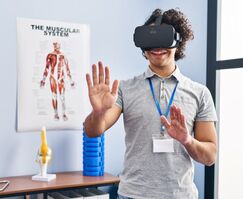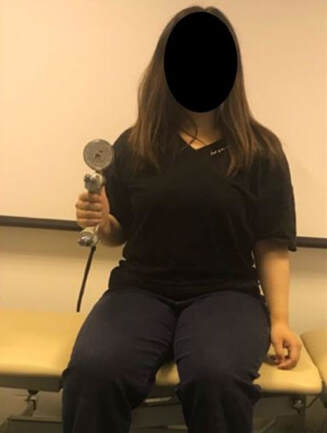 Virtual reality (VR) is an emerging technology that involves the interaction between a user and a computer with real time simulation of environments, functional activities, exercises and games. (Rutkowski et al., 2020). The definition of VR is based on the concept of “presence” which relates to the sense or feeling of being in an all-surrounding environment. There are currently 4 main types of VR:
The sense of ‘presence’ depends on the level of VR immersion. This is dependent upon the type of system used. In healthcare, VR is generally referred to as “specialized” VR (i.e. specifically developed therapeutic VR systems) or gaming VR (i.e. commercial VR-game consoles). Mechanisms The rationale for the use of VR is that enhanced stimulation provided by an artificially generated environment leads to activation of motor learning processes by influencing exteroception and enhancing the feed-forward mechanism of motor planning through goal directed activities. Repetition of efficient movement may then lead to motor re-learning which may transfer to functional activities. The thinking is that the VR environment has the potential to stimulate supervised and reinforcement learning, based on augmented visual, acoustic and sensitive feedback. Clinical applications To date VR has more commonly been used in neurologic rehabilitation (stroke mostly) where VR has resulted in greater improvements in upper limb function compared with conventional rehabilitation. (Rutkowski et al., 2020) It has also been reported in a small number of studies in the geriatric population (falls) and paediatric population (Developmental Coordination Disorder, Cerebral Palsy) where evidence of improvement compared with conventional treatment for lower limb function, gait and balance is not growing and still conflicting. A few studies have been published investigating its use for orthopaedic rehabilitation. (Gumaa & Rehan Youssef, 2019). To date, virtual reality has not shown any significant benefit compared with conventional rehabilitation for RA, knee OA, ankle instability and following ACL reconstruction and there is insufficient evidence to draw any conclusions in fibromyalgia, back pain and following knee arthroplasty.(Rutkowski et al., 2020) Given it’s application to improving movement planning and motor control, I wondered whether there were applications for the shoulder instability population, specifically for those with atraumatic instability, or post-immobilisation following traumatic instability or surgical stabilisation. In these patient groups, there may be inhibition of important stabiliser muscles at motor cortex level. I didn’t find any studies on shoulder instability, but I found one study in which VR had been used in rehabilitation for subacromial impingement syndrome (SAIS). Virtual Reality for Subacromial Impingement Syndrome Virtual reality using Nintendo Wii (boxing, bowling and tennis accompanied by an avatar) was compared with capsular stretching, pectoral stretching, scapula strengthening and bilateral shoulder elevation exercises (Pekyavas & Ergun, 2017) in 30 patients with SAIS. Pain intensity was significantly improved in both groups, however the VR group reported statistically significant improvements in night pain VAS, and pain with Neer, Scapula Assistance and Scapula retraction test compared with the control treatment group. There was also a case report of significant shoulder pain in a hemiplegic patient that was preventing rehabilitation. The pain improved with the concurrent application of VR during passive mobilisation and stretching enabling progression with rehabilitation suggesting VR may have central effects on pain mechanisms. (Funao et al., 2021) Doseage Doseage was variable across all studies:
Summary My motivation for looking into this was to find out whether VR training may be a useful adjunct to neuromuscular rehabilitation for people with motor control impairments around the shoulder (e.g shoulder instability, scapula dyskinesis, persistent shoulder girdle pain). What I have taken out of what I have found is:
Will I be buying a VR set for my shoulder patients? Not yet, but I’ll be watching the literature closely, and if anyone is looking for a research project, how about looking at the use of VR in the shoulder instability population? 😉 References Funao, H., Tsujikawa, M., Momosaki, R., & Shimaoka, M. (2021, Jul). Virtual reality applied to home-visit rehabilitation for hemiplegic shoulder pain in a stroke patient: a case report. J Rural Med, 16(3), 174-178. https://doi.org/10.2185/jrm.2021-003 Gumaa, M., & Rehan Youssef, A. (2019). Is Virtual Reality Effective in Orthopedic Rehabilitation? A Systematic Review and Meta-Analysis. Physical Therapy, 99(10), 1304-1325. https://doi.org/10.1093/ptj/pzz093 Pekyavas, N. O., & Ergun, N. (2017, May). Comparison of virtual reality exergaming and home exercise programs in patients with subacromial impingement syndrome and scapular dyskinesis: Short term effect. Acta Orthop Traumatol Turc, 51(3), 238-242. https://doi.org/10.1016/j.aott.2017.03.008 Rutkowski, S., Kiper, P., Cacciante, L., Cie?lik, B. a. e., Mazurek, J., Turolla, A., & Szczepa?ska-Gieracha, J. (2020, 11/19). Use of virtual reality-based training in different fields of rehabilitation: A systematic review and meta-analysis. Journal of Rehabilitation Medicine, 52(11), 1-16. https://doi.org/10.2340/16501977-2755
5 Comments
Does grip strength correlate with rotator cuff strength in patients with atraumatic shoulder instability?
Turabi R, Horsely I, Birch H, Jaggi A. Does grip strength correlate with rotator cuff strength in patients with atraumatic shoulder instability? Bulletin of Faculty of Physical Therapy. 2022;27(1):1. Objectively measuring rotator cuff strength (‘peak force’ to be exact, but that’s a post for another day) in the clinic can be challenging in certain patients, when time is an issue, when patient strength exceeds therapist strength and when you don’t have the right equipment and set-up to obtain accurate and repeatable measures. I’ve been following a thread of articles lately demonstrating very close agreement between measures of rotator cuff strength and grip strength, the latest looking at the relationship between grip strength and internal/external rotation force measures in people with atraumatic instability. Approx. 2/3 of my clinical caseload are young people with atraumatic shoulder instability and regaining rotator cuff function (including strength) is a critical part of rehabilitation. However, some are not able to attain optimal shoulder strength test positions, and unless you have a reasonable amount of time and the right equipment (and set-up to obtain accurate and reliable measures), direct measures of rotator cuff strength can be difficult to obtain. The simple method of measuring grip strength used in this study produced peak force values that correlated with internal and external rotation peak isometric force values in this patient group (r2 0.70 for the statos out there). Previous studies have produced r2 values up to 0.91 for the correlation between grip strength and external rotation strength (strong correlation). This means that grip strength may provide a simple, quick, convenient and relatively cheap method of indirectly tracking changes in rotator cuff function (peak force) with the following clinical applications: ▪️ for patients who can’t tolerate typical shoulder strength testing positions (due to pain, stiffness, apprehension or fear) ▪️ can be used by small therapists working with stronger patients ▪️ where space, time or access to equipment are limited ▪️ can be used as a 'field' measure of monitoring rotator cuff function in upper limb sports (e.g throwing, swimming). Full text link: https://link.springer.com/content/pdf/10.1186/s43161-021-00059-3.pdf |
Dr Angela CadoganPassionate about learning and helping others to think critically about their practice. I hope these posts stimulate your thinking and help you in clinical practice. Archives
November 2022
Categories
All
|

 RSS Feed
RSS Feed
